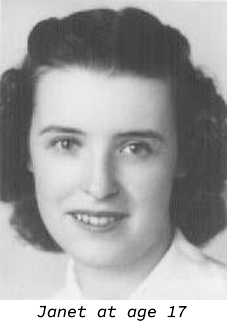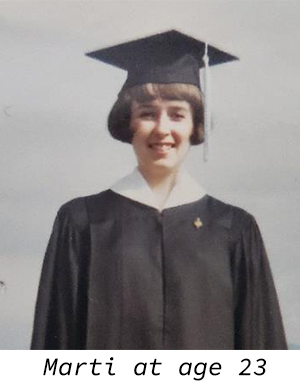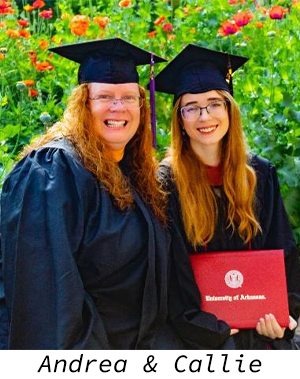Education for Girls and Women of All Ages
 My mother got her college degree when she was almost 73 years old. She died of cancer
before she turned 74. Was it worth it? I think she would say, “Definitely!” She participated
in BYU’s remote education program in the 1990s, before virtual education and even
email was a thing. This was made even more difficult because she was living in Brazil.
All communication with professors and assignments had to be mailed back and forth.
My mother got her college degree when she was almost 73 years old. She died of cancer
before she turned 74. Was it worth it? I think she would say, “Definitely!” She participated
in BYU’s remote education program in the 1990s, before virtual education and even
email was a thing. This was made even more difficult because she was living in Brazil.
All communication with professors and assignments had to be mailed back and forth.
A young woman of the depression, Mom was able to complete high school in 2 years so she could go to work to help support her family. As the mother of nine children, she always found other ways to learn and use her creative talents. She made it clear that she loved the job she had before she got married. But she didn’t want a degree so she could get a job. Seven of her nine children had earned college degrees, and I think part of her wanted to prove that she could do it too. Most of all, she loved learning.
There is no clear data on how many women enroll in college for the first time after age 60 in the U.S. However, some sources suggest that more older adults are pursuing higher education. According to Consumer Reports, at many state universities and colleges, residents 60 and older who meet set requirements can use tuition waivers to take for-credit courses. If you are interested in enrolling in college after age 60 or older, you may want to contact the financial aid office of your preferred institution and ask about their policies and programs for senior citizens.
You may want to go back to school just for the fun of it, but stats from the BLS, in the US, the labor force participation rate of women aged 70 and above was 9.6% in 2020, up from 7.3% in 2010. At age 70, Doris McGhee Collins went back to work full time as the human resources director for a group of Washington, D.D., charter schools. Read more about her story and other seniors who love their jobs in an AARP article here.
 In 1967, I received my BS in Elementary Education from the University of Utah, shortly
after our first son was born. Being a teacher was one of the three or four “acceptable”
professions for which women went to college in those days. It was something a woman
could do and be home when her kids were home from school, and, “There will always
be jobs in teaching.”
In 1967, I received my BS in Elementary Education from the University of Utah, shortly
after our first son was born. Being a teacher was one of the three or four “acceptable”
professions for which women went to college in those days. It was something a woman
could do and be home when her kids were home from school, and, “There will always
be jobs in teaching.”
At Olympus High School, I took classes in Commercial Art, Brush Lettering and AP English. I loved to draw, paint and write and was interested in a career in marketing. However, one of my teachers discouraged me by saying that it was a career I would not be able to “go back to after raising a family.”
Side note: I also wanted to take Auto Mechanics, but girls had to take Sewing &/or Cooking. At my 55th reunion in the new Olympus High School, I learned that now girls can take Auto Mechanics in either a girls-only or an “integrated” class.
In 1981, we were living just outside of Boston. When our fifth child was one, I really wanted to become a working mother. Massachusetts had granted me a teaching certificate good for life, but there were no teaching jobs to be had! The student population was declining, and teachers were being let go. Via “one thing leads to another,” I spent five years writing mostly teachers’ guides and workbooks, grades K-12, for Boston-based textbook publishers DC Heath and Houghton Mifflin—from home on a typewriter.
When my husband decided he wanted a career change that required us to move back to Utah, I called the Utah Department of Education to find out what classes I should take to renew my Utah certificate. They suggested an upper-division class in reading and “something about computers, because they are going to be big.” At age 46, I signed up for classes in Advanced Reading Techniques and Programming in Basic (one of the first computer “languages) for free at the college where Dennis was a professor.
All of the other students in the reading class were currently teaching and could base their projects on their work experiences and needs. I had to fake it. The computer programming class was mostly filled with young men who had personal computers new to the market. I had never even seen one before. I had to use the computers in the lab. To my amazement, I completed both classes with an A grade. It seemed that being older and totally focused on my goal was an advantage. I did renew my Utah certificate.
At about the same time, two of my younger brothers were starting their own computer software company in Salt Lake City. Knowing my background in writing textbooks and my recently acquired knowledge of computers, they hired me to be their part-time technical writer. My job was to figure out how to use the software and then write a manual that would explain it to those who purchased it.
In another case of “one thing leads to another,” before long I was their full-time marketing manager. Ironic, especially considering what I had been told in high school. I kept that job for 20 years—longer than my brothers kept the company. I was able to evolve with computers and keep up with the changes in marketing through reading books, attending seminars, and learning from others in the business. I got the equivalent of another college education on-the-job.
When I retired at age 66, I told several business contacts that I wanted to keep writing and would be willing to do freelance jobs for them as needed. I’m still doing it. Since 2013, I’ve been writing for a home healthcare agency. As a result, I’ve been paid to get an education about caregiving resources and skills that I applied to caring for my father and then my husband. I’ve also been able to help many neighbors and friends who found themselves in a similar situation with loved ones.
 If you’re thinking it may be too late to go back to school, you are probably wrong.
My 52-year-old daughter-in-law, who lives in Sandy just completed a Masters Degree
from a university in Wisconsin. It took her three years, but she did it all from home
virtually. She’s now job hunting. One of her three daughters also got her Masters
degree in Arkansas this year.
If you’re thinking it may be too late to go back to school, you are probably wrong.
My 52-year-old daughter-in-law, who lives in Sandy just completed a Masters Degree
from a university in Wisconsin. It took her three years, but she did it all from home
virtually. She’s now job hunting. One of her three daughters also got her Masters
degree in Arkansas this year.
There are many other ways to continue learning, whether on-the-job or from the comfort of your own home without formally going back to school in an accredited program. Contact your local university to find out about their programs for senior education. You might have a senior center close to you that offers classes on various topics. Check out Salt Lake County’s Active Aging Program here. If you have a computer, you can search for and research any topic you want to learn more about.
Learning new things and creating new habits are two of the best ways to keep our brains sharp. It’s also great for self-esteem and emotional well-being to know that no matter what your age, you can still keep learning and growing.
